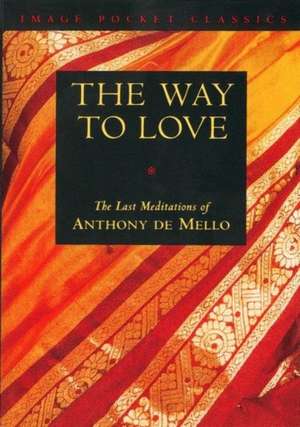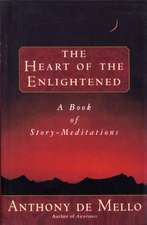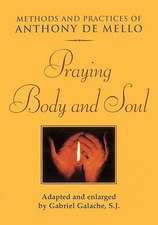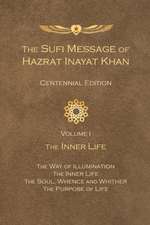Way to Love: The Last Meditations of Anthony de Mello: Image Pocket Classics
Autor Anthony De Melloen Limba Engleză Paperback – 31 mai 1995
| Toate formatele și edițiile | Preț | Express |
|---|---|---|
| Paperback (2) | 61.07 lei 3-5 săpt. | +10.32 lei 7-13 zile |
| IMAGE – 31 mai 1995 | 61.07 lei 3-5 săpt. | +10.32 lei 7-13 zile |
| IMAGE – 31 mai 2012 | 72.60 lei 3-5 săpt. | +12.25 lei 7-13 zile |
Preț: 61.07 lei
Nou
Puncte Express: 92
Preț estimativ în valută:
11.69€ • 12.23$ • 9.67£
11.69€ • 12.23$ • 9.67£
Carte disponibilă
Livrare economică 15-29 martie
Livrare express 01-07 martie pentru 20.31 lei
Preluare comenzi: 021 569.72.76
Specificații
ISBN-13: 9780385249393
ISBN-10: 038524939X
Pagini: 208
Dimensiuni: 89 x 127 x 15 mm
Greutate: 0.09 kg
Editura: IMAGE
Seria Image Pocket Classics
ISBN-10: 038524939X
Pagini: 208
Dimensiuni: 89 x 127 x 15 mm
Greutate: 0.09 kg
Editura: IMAGE
Seria Image Pocket Classics
Notă biografică
Anthony deMello was a Jesuit Priest known throughout the world for his writings and spiritual conferences. He died suddenly in 1987. Among his many books are Sadhana and The Song of the Bird.
Extras
Introduction
Years ago, when I first heard of Tony de Mello, S.J., I didn’t believe what I heard. The story I am about to tell has bearing on the book you are about to read.
I was told that Tony gave a retreat to sixty fellow Jesuit priests and spoke to them six hours a day for eight days. I remember saying, “No Jesuit listens to another Jesuit six hours a day for eight days.” When the fact was insisted on, I remember asking, “Who made that retreat?” The names of some very impressive Jesuits (impressive, at least, to me) were mentioned. It was then, like doubting Thomas in the Scriptures, I said, “This I have to see and hear for myself.”
Thus began the journey with the man who would affect my life so profoundly that, years later, I wouldn’t even recognize the person I was those years past. And not I alone, but thousands of others like me.
The occasion of my first meeting Tony de Mello now seems rather prosaic. He was asked to give a weekend retreat to a group of lay people. He agreed to do this on his way back to India from Rome. I asked to be put on that retreat just to meet and experience the man. It was an unforgettable weekend up in Saddle River, New Jersey, amid the snows of February.
I will never forget the feeling of liberation; the sense he made of spirituality, of prayer, of the meaning of life; his humor; his marvelous storytelling. And it was all done in such a personal style. Years later, when he was speaking by television satellite to more than three thousand college students, he maintained that personal style. “About twelve years ago,” he remarked, “I discovered something that revolutionized my life.” He had met a rickshaw driver in Calcutta named Rinsai, who, although he was dying of a painful disease and was so poor that he had to sell his skeleton before he died, still was a man filled with faith and interior joy. “I suddenly realized,” Tony continued, “I was in the presence of a mystic who had rediscovered life. He was alive; I was dead. He was a man who had reincarnated himself during this life.”
The reason I say that the story of my meeting Tony has bearing on the book you are about to read is because when I came upon this manuscript, although I was very familiar with all that he had written (and spoken), I was amazed at how these small but powerful “meditations” evoked in me the same feelings I experienced when I first encountered him. Just reading through these pages brought back the wonderful sense of challenge, the spiritual provocation that Tony was such a master at providing. There was a basic honesty in Tony de Mello’s character with which he reevaluated everything in his own life. And it was this honesty that he communicated so effectively to all who would listen. His analogies, his stories, his telling criticism of sacred cows—all brilliantly peppered throughout this book—inspired in me a like revaluation of my own life, and I have never regretted it.
Take each one of these meditations and carry them with you throughout your day. Challenge his ideas, mull over his thoughts, and then be silent. You will notice an effortless transformation taking place in your heart, the awakening experience of insight, the wonderful peace you experience when you gaze at the stars or watch a beautiful sunrise or glimpse a soft look of love in the eyes of your beloved. This is the effect these spiritual gems will have. All you need bring to them is a full heart and an inquiring mind.
J. Francis Stroud, S.J. The Center for Spiritual Exchange Fordham University Bronx, N.Y.
Profit and Loss
For what will it profit a man, if he
gains the whole world and forfeits
his life?
—Matthew 16:26
Recall the kind of feeling you have when someone praises you, when you are approved, accepted, applauded. And contrast that with the kind of feeling that arises within you when you look at the sunset or the sunrise or Nature in general, or when you read a book or watch a movie that you thoroughly enjoy. Get the taste of this feeling and contrast it with the first, namely, the one that was generated within you when you were praised. Understand that the first type of feeling comes from self-glorification, self-promotion. It is a worldly feeling. The second comes from self-fulfillment, a soul feeling.
Here is another contrast: Recall the kind of feeling you have when you succeed, when you have made it, when you get to the top, when you win a game or a bet or an argument. And contrast it with the kind of feeling you get when you really enjoy the job you are doing, you are absorbed in, the action that you are currently engaged in. And once again notice the qualitative difference between the worldly feeling and the soul feeling.
Yet another contrast: Remember what you felt like when you had power, you were the boss, people looked up to you, took orders from you; or when you were popular. And contrast that worldly feeling with the feeling of intimacy, companionship—the times you thoroughly enjoyed yourself in the company of a friend or with a group in which there was fun and laughter.
Having done this, attempt to understand the true nature of worldly feelings, namely, the feelings of self-promotion, self-glorification. They are not natural, they were invented by your society and your culture to make you productive and to make you controllable. These feelings do not produce the nourishment and happiness that is produced when one contemplates Nature or enjoys the company of one’s friends or one’s work. They were meant to produce thrills, excitement—and emptiness.
Then observe yourself in the course of a day or a week and think how many actions of yours are performed, how many activities engaged in that are uncontaminated by the desire for these thrills, these excitements that only produce emptiness, the desire for attention, approval, fame, popularity, success or power.
And take a look at the people around you. Is there a single one of them who has not become addicted to these worldly feelings? A single one who is not controlled by them, hungers for them, spends every minute of his/her waking life consciously or unconsciously seeking them? When you see this you will understand how people attempt to gain the world and, in the process, lose their soul. For they live empty, soulless lives.
And here is a parable of life for you to ponder on: A group of tourists sits in a bus that is passing through gorgeously beautiful country; lakes and mountains and green fields and rivers. But the shades of the bus are pulled down. They do not have the slightest idea of what lies beyond the windows of the bus. And all the time of their journey is spent in squabbling over who will have the seat of honor in the bus, who will be applauded, who will be well considered. And so they remain till the journey’s end.
Discipleship
If anyone comes to me and does not hate his own father and mother and wife and children and brothers and sisters, yes, and even his own life, he cannot be my disciple.
—Luke 14:26
Take a look at the world and see the unhappiness around you and in you. Do you know what causes this unhappiness? You will probably say loneliness or oppression or war or hatred or atheism. And you will be wrong. There is only one cause of unhappiness: the false beliefs you have in your head, beliefs so widespread, so commonly held, that it never occurs to you to question them. Because of these false beliefs you see the world and yourself in a distorted way. Your programming is so strong and the pressure of society so intense that you are literally trapped into perceiving the world in this distorted kind of way. There is no way out, because you do not even have a suspicion that your perception is distorted, your thinking is wrong, and your beliefs are false.
Look around and see if you can find a single genuinely happy person—fearless, free from insecurities, anxieties, tensions, worries. You would be lucky if you found one in a hundred thousand. This should lead you to be suspicious of the programming and the beliefs that you and they hold in common. But you have also been programmed not to suspect, not to doubt, just to trust the assumptions that have been put into you by your tradition, your culture, your society, your religion. And if you are not happy, you have been trained to blame yourself, not your programming, not your cultural and inherited ideas and beliefs. What makes it even worse is the fact that most people are so brainwashed that they do not even realize how unhappy they are—like the man in a dream who has no idea he is dreaming.
What are these false beliefs that block you from happiness? Here are some examples. First: You cannot be happy without the things that you are attached to and that you consider so precious. False. There is not a single moment in your life when you do not have everything that you need to be happy. Think of that for a minute. The reason why you are unhappy is because you are focusing on what you do not have rather than on what you have right now.
Another belief: Happiness is in the future. Not true. Right here and now you are happy and you do not know it because your false beliefs and your distorted perceptions have got you caught up in fears, anxieties, attachments, conflicts, guilt and a host of games that you are programmed to play. If you would see through this you would realize that you are happy and do not know it.
Yet another belief: Happiness will come if you manage to change the situation you are in and the people around you. Not true. You stupidly squander so much energy trying to rearrange the world. If changing the world is your vocation in life, go right ahead and change it, but do not harbor the illusion that this is going to make you happy. What makes you happy or unhappy is not the world and the people around you, but the thinking in your head. As well search for an eagle’s nest on the bed of an ocean, as search for happiness in the world outside of you. So if it is happiness that you seek you can stop wasting your energy trying to cure your baldness or build up an attractive body or change your residence or job or community or lifestyle or even your personality. Do you realize that you could change every one of these things, you could have the finest looks and the most charming personality and the most pleasant of surroundings and still be unhappy? And deep down you know this is true but still you waste your effort and energy trying to get what you know cannot make you happy.
Another false belief: If all your desires are fulfilled you will be happy. Not true. In fact it is these very desires and attachments that make you tense, frustrated, nervous, insecure and fearful. Make a list of all your attachments and desires and to each of them say these words: “Deep down in my heart I know that even after I have got you I will not get happiness.” And ponder on the truth of those words. The fulfillment of desire can, at the most, bring flashes of pleasure and excitement. Don’t mistake that for happiness.
What then is happiness? Very few people know and no one can tell you, because happiness cannot be described. Can you describe light to people who have been sitting in darkness all their lives? Can you describe reality to someone in a dream? Understand your darkness and it will vanish; then you will know what light is. Understand your nightmare for what it is and it will stop; then you will wake up to reality. Understand your false beliefs and they will drop; then you will know the taste of happiness.
If people want happiness so badly, why don’t they attempt to understand their false beliefs? First, because it never occurs to them to see them as false or even as beliefs. They see them as facts and reality, so deeply have they been programmed. Second, because they are scared to lose the only world they know: the world of desires, attachments, fears, social pressures, tensions, ambitions, worries, guilt, with flashes of the pleasure and relief and excitement which these things bring. Think of someone who is afraid to let go of a nightmare because, after all, that is the only world he knows. There you have a picture of yourself and of other people.
If you wish to attain to lasting happiness you must be ready to hate father, mother, even your own life and to take leave of all your possessions. How? Not by renouncing them or giving them up because what you give up violently you are forever bound to. But rather by seeing them for the nightmare they are; and then, whether you keep them or not, they will have lost their grip over you, their power to hurt you, and you will be out of your dream at last, out of your darkness, your fear, your unhappiness.
So spend some time seeing each of the things you cling to for what it really is, a nightmare that causes you excitement and pleasure on the one hand but also worry, insecurity, tension, anxiety, fear, unhappiness on the other.
Father and mother: nightmare. Wife and children, brothers and sisters: nightmare. All your possessions: nightmare. Your life as it is now: nightmare. Every single thing you cling to and have convinced yourself you cannot be happy without: nightmare. Then you will hate father and mother, wife and children, brothers and sisters and even your own life. And you will so easily take leave of all your possessions, that is, you will stop clinging and thus have destroyed their capacity to hurt you. Then at last you will experience that mysterious state that cannot be described or uttered—the state of abiding happiness and peace. And you will understand how true it is that everyone who stops clinging to brothers or sisters, father, mother or children, land or houses . . . is repaid a hundred times over and gains eternal life.
Descriere
In 31 meditations, de Mello implores his readers with his usual pithiness to break through illusion, the great obstacle to love. "The most painful act", de Mello says, "is the act of seeing. But in that act of seeing, love is born".















